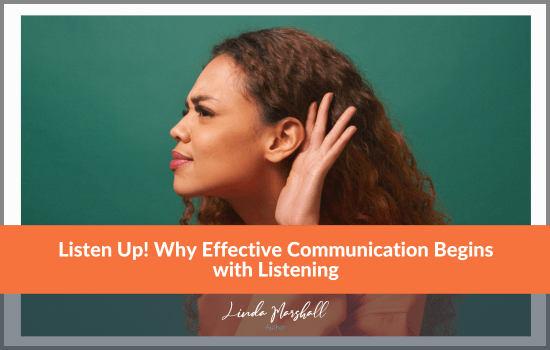Active listening is the cornerstone of effective communication, a key driver of emotional intelligence, and a powerful tool for fostering empathy. Active listening enhances our ability to build strong relationships and connect more deeply.
THE POWER OF EMOTION | CHAPTER 27 | SOCIAL AWARENESS
Listening to Understand: Keys to Meaningful Interactions

Listening Impacts Emotional Intelligence, Communication, and Relationships.
"We speak in order to be heard and need to be heard in order to be understood." (- R. Jakobson and L. Waugh, 1979, The Sound Shape of Language)
If you truly want to show someone that you care about what they're saying, the best thing you can do is listen—fully, attentively, and with intention.
Why Is Active Listening So Important?
Most of us speak with the goal of being heard and understood. But understanding isn't automatic—it requires active effort from both the speaker and the listener. We engage authentically by genuinely listening, developing deeper connections, and cultivating stronger communication and relationships.
Listening isn't just about hearing words; it's about understanding them. Research shows that communication is conveyed through multiple channels:
-
7% of meaning comes from the actual words used.
-
38% comes from the speaker's tone of voice.
-
55% is communicated through body language and nonverbal cues. * Source: Mehrabian, 1981
Without question, we need to hear what is said and what is not said during communication with everyone we encounter. I believe this is the secret ingredient to positive relationships.
Have You Ever Felt Ignored in a Conversation?
We've all been there—talking to someone who's distracted, uninterested, or only half-listening. Maybe the person we speak with is checking their phone, looking around the room, or simply waiting for their turn to speak. This behaviour can be frustrating.
And let's be honest, we've all been guilty of this too. Sometimes, we drift off during conversations, thinking about our to-do lists or feeling disengaged from the conversation. However, when we fail to listen, we miss valuable insights, weaken our relationships, and demonstrate a lack of empathy.
The Link Between Listening and Empathy
Active listening not only helps us absorb more information—it also strengthens our compassion and empathy. Studies show that empathetic listening enhances trust, reduces conflict, and increases cooperation in both personal and professional relationships. Listening with empathy means truly hearing someone, understanding their perspective, and validating their emotions. It's one of the most powerful ways to connect with others on a deeper level.
When we listen empathetically, we acknowledge both the content of what's being said and the emotions behind it. This behaviour shows the speaker that we care about their words, experiences, feelings, and perspectives.
The Science Behind Active Listening and Emotional Intelligence
Research from Harvard Business Review suggests that great listeners do more than remain silent while others talk. They ask thoughtful follow-up questions, engage in active body language, and provide feedback that makes the speaker feel valued and appreciated. Neuroscientists also note that active listening engages the prefrontal cortex, a region that plays a crucial role in emotional regulation and social interactions. So, active listening enhances emotional intelligence.
10 Ways to Practice Active Listening
Want to become a better listener? Here are ten practical strategies to help you enhance your listening skills:
-
Maintain Eye Contact – Show attentiveness by making direct eye contact with the speaker.
-
Avoid Interrupting – Allow the speaker to finish their thoughts before responding.
-
Paraphrase What You Heard – Summarize what they've said in your own words to confirm understanding.
-
Ask Open-Ended Questions – Encourage deeper conversation by asking thoughtful, open-ended questions.
-
Minimize Distractions – Put away electronic devices and focus solely on the conversation.
-
Use Nonverbal Cues – Nod, smile, and other gestures to show engagement.
-
Reflect Feelings – Acknowledge the emotions behind the speaker's words to convey empathy.
-
Summarize Key Points – Recap main ideas to reinforce understanding and retention.
-
Withhold Judgment – Keep an open mind and avoid forming conclusions prematurely.
-
Be Fully Present – Stay mentally engaged and resist the urge to let your mind wander.
The Power of Listening in Strengthening Relationships
When we commit to active listening, we improve our communication skills and demonstrate respect, empathy, and emotional intelligence. Strong listening skills allow us to connect with others meaningfully, making our relationships more authentic and fulfilling.
Studies indicate that workplaces with a culture of active listening experience higher employee satisfaction, lower turnover rates, and increased productivity. In personal relationships, active listening fosters emotional closeness, reduces misunderstandings, and deepens trust.
The Bottom Line
Listening isn't just about hearing—it's about understanding, connecting, and showing that we care. Being a mindful listener is a rare and valuable skill in a world where distractions are everywhere. Practicing active listening can improve our personal and professional relationships and elevate our emotional intelligence. For more strategies on developing emotional intelligence and mastering the art of listening, check out my book, The Power of Emotion.
This article was originally published on February 17, 2023, and was updated in February 2025.
Get Social With Linda Marshall and Share
INSTAGRAM @LindaMarshallAuthor | FACEBOOK @LindaMarshallAuthor


